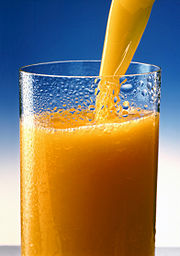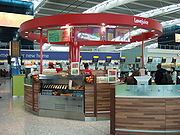
Juice
Background to the schools Wikipedia
SOS Children has tried to make Wikipedia content more accessible by this schools selection. Visit the SOS Children website at http://www.soschildren.org/
Juice is the liquid that is naturally contained in fruit or vegetable tissue.
Juice is prepared by mechanically squeezing or macerating fresh fruits or vegetables flesh without the application of heat or solvents. For example, orange juice is the liquid extract of the fruit of the orange tree. Juice may be prepared in the home from fresh fruits and vegetables using a variety of hand or electric juicers.
Many commercial juices are filtered to remove fibre or pulp, but high-pulp fresh orange juice is a popular beverage. Juice may be marketed in concentrate form, sometimes frozen, requiring the user to add water to reconstitute the liquid back to its "original state". However, concentrates generally have a noticeably different taste from that of their "fresh-squeezed" counterparts. Other juices are reconstituted before packaging for retail sale.
Common methods for preservation and processing of fruit juices include canning, pasteurization, freezing, evaporation and spray drying.
In the United Kingdom the name of a fruit or fruits followed by juice can only legally be used to describe a product which is 100% fruit juice, as required by the Fruit Juices and Fruit Nectars (England) Regulations and the Fruit Juices & Fruit Nectars (Scotland) Regulations 2003. However a juice made by reconstituting concentrate can be called juice. A product described as the "nectar" of a fruit must contain a minimum of juice between 25% and 50% for different fruitcakes. A juice or nectar including concentrate must state that it does. The term "juice drink" is not defined in the Regulations and can be used to describe any drink which includes juice, however little. Comparable rules apply in all EU member states in their respective languages.
In the USA fruit juice can only legally be used to describe a product which is 100% fruit juice. A blend of fruit juice(s) with other ingredients, such as high-fructose corn syrup, is called a juice cocktail or juice drink. According to the Food and Drug Administration (FDA), the term "nectar" is generally accepted in the U.S. and in international trade for a diluted juice to denote a beverage that contains fruit juice or puree, water, and which may contain artificial sweeteners.
In New Zealand and Australia particularly (and others) juice denotes a sweetened fruit extract, whereas nectar denotes a pure fruit or vegetable extract.
Fruit juice labels may be misleading, with juice companies actively hiding the actual content. "No added sugar" is commonly printed on labels, but the products may contain large amounts of naturally occurring sugars; however, sugar content is listed with other carbohydrates on labels in many countries.
Some carbonated beverages, not described as fruit juice, contain fruit juice (such as Mountain Dew, which contains orange juice).
Health effects
Juices are often consumed for their perceived health benefits. For example, orange juice is rich in vitamin C, folic acid, potassium, is an excellent source of bioavailable antioxidant phytochemicals and significantly improves blood lipid profiles in people affected with hypercholesterolemia. Prune juice is associated with a digestive health benefit. Cranberry juice has long been known to help prevent or even treat bladder infections, and it is now known that a substance in cranberries prevents bacteria from binding to the bladder.
The high sugar content of fruit juices is often not realized—many fruit juices have a higher sugar ( fructose) content than sweetened soft drinks; e.g., typical grape juice has 50% more sugar than Coca Cola. The comparison is not very fair however, because while soft drinks (e.g. Coca Cola) cause oxidative stress when ingested and may even lead to insulin resistance in the long term, the same thing cannot be attributed to fruit juices. On the contrary, fruit juices are actually known for their ability to raise serum antioxidant capacity and even offset the oxidative stress and inflammation normally caused by high-fat and high-sugar meals.
Fruit juice consumption overall in Europe, Australia, New Zealand and the USA has increased in recent years, probably due to public perception of juices as a healthy natural source of nutrients and increased public interest in health issues. Indeed, fruit juice intake has been consistently associated with reduced risk of many cancer types, might be protective against stroke and delay the onset of Alzheimer's disease.
The perception of fruit juice as equal in health benefit to fresh fruit has been questioned, mainly because it lacks fibre and has often been highly processed. High-fructose corn syrup, an ingredient of many juice cocktails, has been linked to the increased incidence of type II diabetes. High consumption of juice is also linked to weight gain in some studies, but not in others. In a controlled clinical study, regular consumption of grape juice for 12 weeks did not cause any weight gain in volunteers, but consumption of soft drink did. Fruit juice in moderate amounts can help children and adults meet daily recommendations for fruit consumption, nutrient intake and calories.
Juice bar
A juice bar is an establishment which primarily serves prepared juice beverages. It shares some of the characteristics of a bar or coffeehouse ( café).


